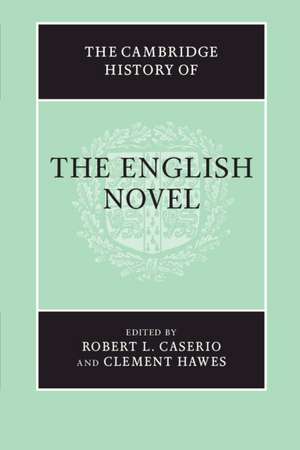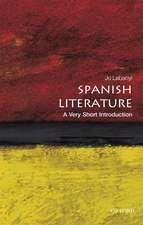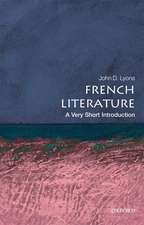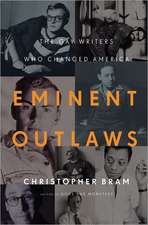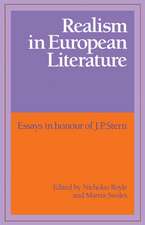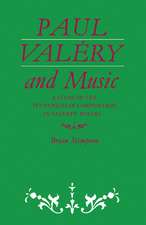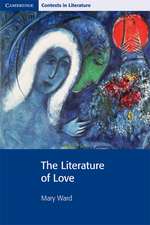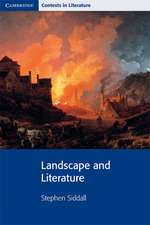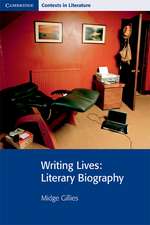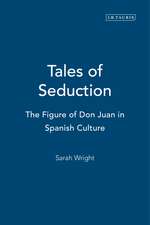The Cambridge History of the English Novel
Editat de Robert L. Caserio, Clement Hawesen Limba Engleză Paperback – 20 ian 2021
| Toate formatele și edițiile | Preț | Express |
|---|---|---|
| Paperback (1) | 276.72 lei 3-5 săpt. | +61.02 lei 5-11 zile |
| Cambridge University Press – 20 ian 2021 | 276.72 lei 3-5 săpt. | +61.02 lei 5-11 zile |
| Hardback (1) | 1444.11 lei 6-8 săpt. | |
| Cambridge University Press – 11 ian 2012 | 1444.11 lei 6-8 săpt. |
Preț: 276.72 lei
Nou
Puncte Express: 415
Preț estimativ în valută:
52.95€ • 55.42$ • 44.07£
52.95€ • 55.42$ • 44.07£
Carte disponibilă
Livrare economică 10-24 martie
Livrare express 22-28 februarie pentru 71.01 lei
Preluare comenzi: 021 569.72.76
Specificații
ISBN-13: 9781108745437
ISBN-10: 1108745431
Pagini: 956
Ilustrații: 2 b/w illus.
Dimensiuni: 151 x 225 x 45 mm
Greutate: 1.45 kg
Editura: Cambridge University Press
Colecția Cambridge University Press
Locul publicării:Cambridge, United Kingdom
ISBN-10: 1108745431
Pagini: 956
Ilustrații: 2 b/w illus.
Dimensiuni: 151 x 225 x 45 mm
Greutate: 1.45 kg
Editura: Cambridge University Press
Colecția Cambridge University Press
Locul publicării:Cambridge, United Kingdom
Cuprins
Introduction Robert L. Caserio and Clement Hawes; 1. The novel before 'the novel' John Richetti; 2. Biographical form in the novel Alan Downie; 3. Legal discourse and novelistic form Eleanor Shevlin; 4. Novelistic history Clement Hawes; 5. Interiorities Elaine McGirr; 6. Samuel Richardson Carol Flynn; 7. Domesticity and novel narratives Cynthia Wall; 8. Obscenity and the erotics of fiction Tom Keymer; 9. Cognitive alternatives to interiority Lisa Zunshine; 10. The novel, the British nation, and Britain's four kingdoms Janet Sorensen; 11. Money's productivity in narrative fiction Liz Bellamy; 12. 'The southern unknown countries': imagining the Pacific in the eighteenth-century novel Robert Markley; 13. Editorial fictions: paratexts, fragments, and the novel Barbara Benedict; 14. Extraordinary narrators: it-narratives and metafiction Mark Blackwell; 15. Romance redivivus Scott Black; 16. Gothic success and Gothic failure: formal innovation in a much-maligned genre George Haggerty; 17. Sir Walter Scott: historiography contested by fiction Murray Pittock; 18. How and where we live now: Edgeworth, Austen, Dickens, and Trollope Barry Weller; 19. From Wollstonecraft to Gissing and Hardy: the revolutionary emergence of women, children, and labor in novelistic narrative Carolyn Lesjak; 20. Space and places (I): the four nations Deborah Epstein Nord; 21. Dickens, Charlotte Brontë, Gaskell: politics and its limits Amanda Anderson; 22. Populations: pictures of prose in Hardy, Austen, Eliot, and Thackeray Aaron Fogel; 23. The novel amid new sciences Phillip Mallett; 24. George Eliot's past and present: emblematic histories Barry V. Qualls; 25. The Bildungsroman Brigid Lowe; 26. The novel and social cognition: internalist and externalist perspective Alan Palmer; 27. Clamors of Eros Richard A. Kaye; 28. The novel as immoral, antisocial force Christopher Lane; 29. Sensations: Gothic, horror, crime fiction, detective fiction Peter K. Garrett; 30. Realism and romance Francis O'Gorman; 31. Representations of spaces and places (II): around the globe David James; 32. Imperial romance Robert L. Caserio; 33. The art novel: impressionists and aesthetes Jesse Matz; 34. The impact of lyric, drama, and verse narrative on novel form Stefanie Markovits; 35. Henry James and Joseph Conrad: the pursuit of autonomy Robert Hampson; 36. Joyce: the modernist novel's revolution in matter and manner Derek Attridge; 37. Richardson, Woolf, Lawrence: the modernist novel's experiments with narrative (I) Mark Wollaeger; 38. Wells, Forster, Firbank, Lewis, Huxley, Compton-Burnett, Green: the modernist novel's experiments with narrative (II) Jonathan Greenberg; 39. Beyond autonomy: political dimensions of modernist novels Morag Shiach; 40. Fiction by women: continuities and changes, 1930–1990 Elizabeth Maslen; 41. The novel amidst other discourses Patricia Waugh; 42. The novel and thirty years of war Marina MacKay; 43. Thrillers Allan Hepburn; 44. Novelistic complications of spaces and places: the four nations and regionalism Dominic Head; 45. The series novel: a dominant form Suzanne Keen; 46. The novel's West Indian revolution Peter Kalliney; 47. Post-war renewals of experiment, 1945–1979 Philip Tew; 48. The novel amidst new technology and media Julian Murphet; 49. Novels of same-sex desire Gregory Woods; 50. From Wells to John Berger: the social democratic era of the novel Charles Ferrall; 51. The postcolonial novel: history and memory C. L. Innes; 52. History and heritage: the English novel's persistent historiographical turn Peter Childs; 53. Twentieth-century satire: the poetics and politics of negativity James F. English; 54. Unending romance: science fiction and fantasy in the twentieth century Edward James and Farah Mendlesohn; Bibliography; Index.
Recenzii
'… magnificent, massive … comprehensive resource … written by experts … a significant, readable introductory chapter and excellent editorial apparatus … Recommended. Undergraduates, graduate students, and faculty.' Choice
'The collection does a very fine job of meeting the challenge of appealing to a range of audiences, with the overall caliber and clarity of the writing a pronounced pleasure.' Rae Greiner, Modern Philology
'The Cambridge History of the English Novel, edited by Robert L. Caserio and Clement Hawes, is a hefty, well-produced collection of essays … The collection does a very fine job of meeting the challenge of appealing to a range of audiences, with the overall caliber and clarity of the writing a pronounced pleasure.' Rae Greiner, Modern Philology
'The collection does a very fine job of meeting the challenge of appealing to a range of audiences, with the overall caliber and clarity of the writing a pronounced pleasure.' Rae Greiner, Modern Philology
'The Cambridge History of the English Novel, edited by Robert L. Caserio and Clement Hawes, is a hefty, well-produced collection of essays … The collection does a very fine job of meeting the challenge of appealing to a range of audiences, with the overall caliber and clarity of the writing a pronounced pleasure.' Rae Greiner, Modern Philology
Descriere
Authoritative, bold and clear, the History raises multiple useful questions for future explorations of the genre.
